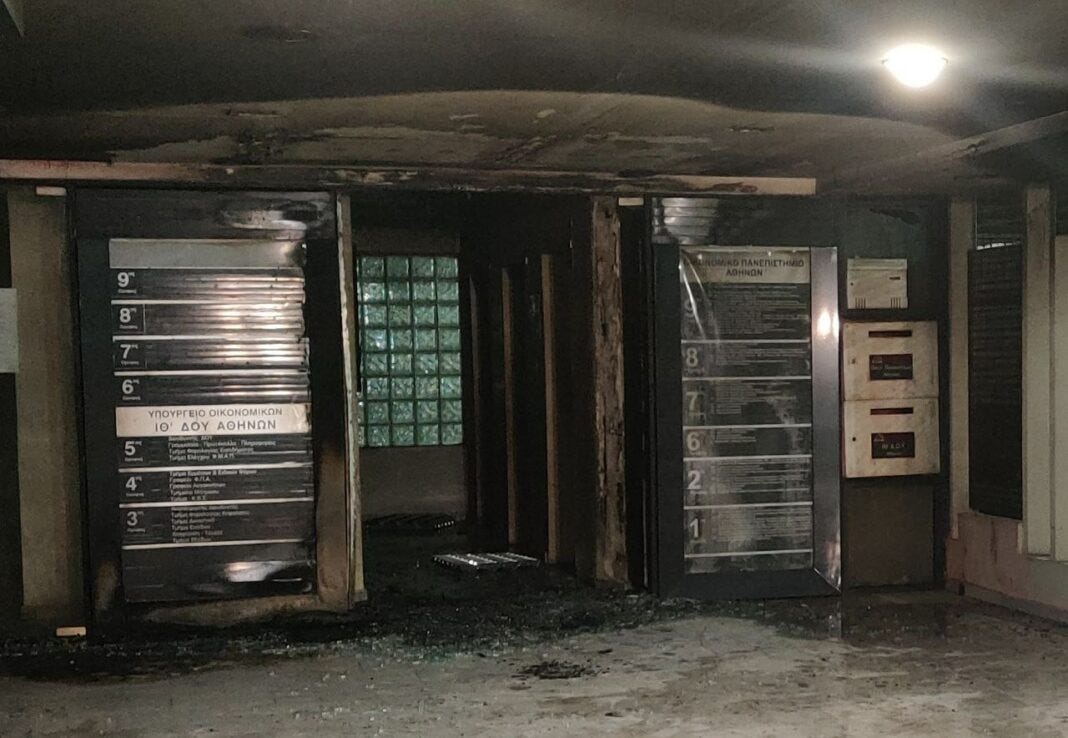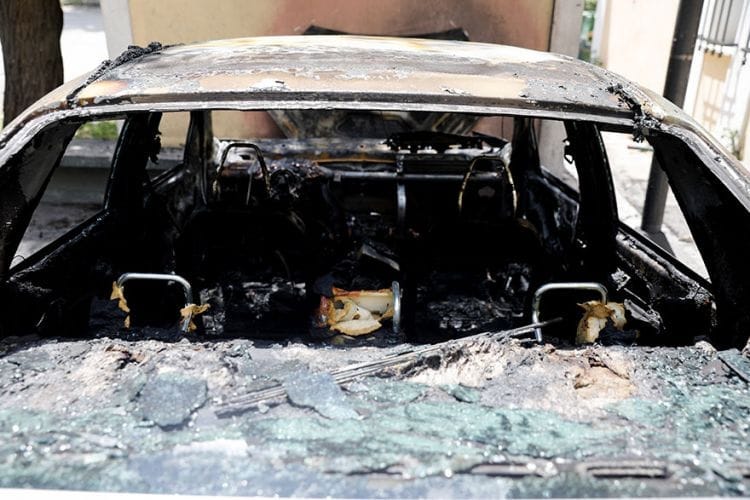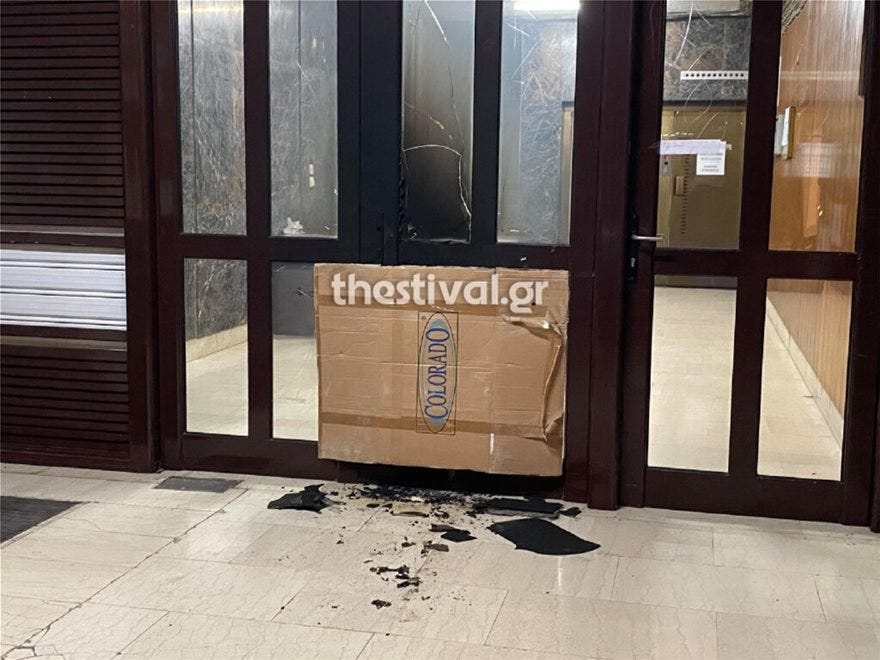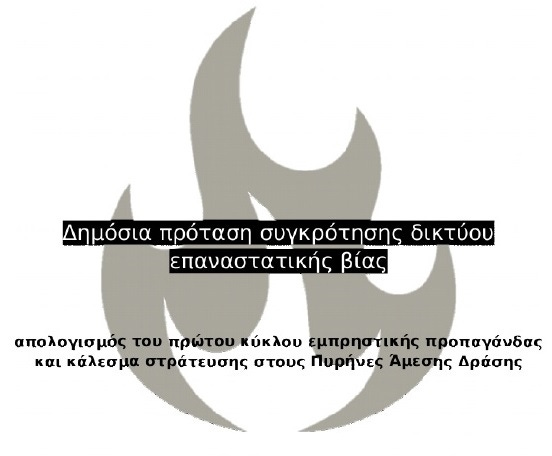Organizing Anarchy: Communique Calls for a “Network of Revolutionary Violence” in Greece (Direct Action Cells)
Anarchists in Greece have released a new communique claiming 20 attacks on state and private property in Athens and Thessaloniki, most of which were carried out between January and March of this year. The communique calls for the establishment of a new “network of revolutionary violence”: the Direct Action Cells, DAC (Πυρήνων Άμεσης Δράσης—PAD in Greek). The DAC began claiming the placement of gas canister bombs and arson attacks earlier this year, but their recent communique is meant to showcase the entirety of their operational resume, while establishing a strategic doctrine to be shared and implemented by smaller cells within the nascent network. The communique also establishes specific anarchist cells that have claimed attacks this year using limited operational names as belonging to the DAC, including the Nucleus of Anarchist Anti-Violence, the Organization of Anarchist Action, the Cell of Anti-Government Rage, the Cell of Revolutionary Solidarity, and the Elizabeth Kovalskaya Cell. By consolidating the many underground anarchist cells already active in Greece, as well as creating a larger network for emerging cells to join, the DAC look to improve their political and military capabilities versus the larger and more organized forces of the state.
The Attacks
Athens
On the evening of January 23rd an improvised explosive device (IED) made from gas canisters was detonated at the entrance of the Institute for Economic and Industrial Research in the Koukaki neighborhood of Athens, causing damage to the building and a nearby parked car. That same night a similar IED consisting of multiple gas canisters was detonated in front of the entrance to a building housing a government tax office as well as offices belonging to the Athens University of Economics and Business in the Kypseli neighborhood. Next, they targeted the home of a high-ranking government official in the northwest Athens suburb of Ilion, placing an IED similar to the first two in front of his home and successfully detonating it on the night of January 28th. A police vehicle in the neighborhood of Petralona was then firebombed, and all of the attacks were subsequently claimed by the DAC in a February 2nd post on an international anarchist website. In the claim they stated: “Let us finally do the obvious. Let us attack state terrorism and its mercenaries in uniform.”
(From the Kypseli attack)
The Direct Action Cells then targeted the home of retired lieutenant general of the Hellenic Police, Christos Kontaridis, and that of police brigadier general, Michalis Ladomenou with arson attacks. In their claim for the attacks, the DAC single out Kontaridis’ role in working with Greece’s notorious riot unit, the MAT, as well as his political career as an aspirant MP for the ruling right-wing party, New Democracy (ND):
Kontaridis was probably the bloodiest MAT officer trainer. From 1994 to 2008 he was on the front lines of the crackdown, being responsible for dozens of incidents of police violence against protesters. He continued his miserable career in high positions within the repressive mechanism, redeeming the fact that he was a leading and loyal mastiff of the state and capital. After he was demobilized from the police, he ran in the elections as a candidate for ND MP. To this day, he writes non-stop, aligning himself with the far-right political agenda and reinforcing fascist perceptions within the repressive mechanisms.
The claim offers further insight into the organizational objectives of the DAC as a broader network of revolutionary violence in Greece, and calls on like-minded anarchists to “rekindle our revolutionary aspirations by building social and political structures capable of standing on their own two feet and actually threatening the balance of power, speaking the only language they can understand: the language of violence.”
A subsequent communique claimed the arson attack at the home of retired lieutenant general of the police, Giannis Katsiamakis, and the firebombing of a vehicle belonging to Katerina Magga, the Chief of Patissia Police Department, north of downtown Athens. This has so far been the extent of their activity in Athens.
Thessaloniki
In addition to the eight actions claimed in Athens, the Direct Action Cells have so far taken responsibility for twelve attacks on high profile targets in Thessaloniki since the start of this year. Their target selection in Greece’s second city has ranged from the homes of notable members of the Hellenic Police and those of right-wing politicians, to the firebombing of a vehicle belonging to the Greek diplomatic corps. Their tactics have largely remained consistent across the two cities, and consist of incendiary attacks using Molotov cocktails, or more sophisticated attacks employing IED’s made from gas canisters.
Notable among the twelve attacks claimed by the DAC in the Thessaloniki area is another gas canister IED detonation outside of military residences adjacent to NATO headquarters in the town of Evzoni, north of Thessaloniki and near the border with the Republic of North Macedonia. They also attempted to detonate another IED fashioned from a gas canister in front of the Hellenic-American Union offices in Thessaloniki, but the device was apparently compromised and the attack resulted in minimal damage to the front façade of the building.
(From the attack on the Hellenic-American Union offices)
The Proposal
In their latest communique claiming all 20 attacks across mainland Greece, the Direct Action Cells seek to orient the current paroxysm of anti-authoritarian political violence in the country under the banner of a single, horizontally-structured movement, much like that which existed earlier in the 2010s under the Conspiracy of Cells of Fire (CCF). The formation of this new network is an attempt to create a singular campaign of covert street militancy against the state and symbols of capitalism, in which the actions of small cells and individual actors can be attributed to the larger military effort against the Greek government and various private entities.
The creation of this illegal political venture is a collective starting point for a struggle. Comrades who participated in groups, nuclei or individual initiatives of aggressive actions, we decided to create a political formation of revolutionary violence, which will coordinate its action in order to multiply the dynamics of its blows. It will advance the need for organized and coordinated action so that our attacks are not piecemeal actions, but direct their dynamics around a tangible strategy, around a political plan to break with the system.
The latest communique also serves as a call-to-arms for individuals and small cells that are contemplating covert action, but have so far lacked proper direction and encouragement, or a specific campaign to act upon:
… because the war against power is not an occasional hobby but a life choice. Because such a choice can cost the loss of a partner's life or freedom. Because the promotion of a political plan that aims to clash dynamically with the state and capital, requires commitments around organizational and political needs that arise. It requires consistency in the responsibilities that each and every one of them has to take in order to carry out a political initiative or a specific plan. It requires seriousness, humility and understanding, so that together we can breathe new life into the struggle for the abolition of exploitation and oppression.
(Public proposal to establish a network of revoultionary violence. Report of the first cycle of propaganda-of-the-deed, and a call for mobilization within the Direct Action Cells)
Analysis: Why Now?
Greece has seen a series of driving factors for increased political violence since the electoral victory of New Democracy in the summer of 2019, especially among the far-left and post-left movements that make up a large part of the country’s political landscape. ND ran on a law-and-order nationalist platform that promised to rid Greece of so-called “lawless” neighborhoods and squatted buildings that, in some cases, have been occupied by anarchists for over a decade. The country also witnessed Europe’s first high-profile hunger-strike since the death of Bobby Sands in 1981, in which Marxist-Leninist urban guerrilla and convicted terrorist Dimitris Koufodinas went without food and later without liquids for over 60 days, protesting a prison transfer. The hunger-strike of Koufodinas was followed by that of other well-known incarcerated urban guerrillas from a group that came out of the movement’s subsequent generation, Revolutionary Struggle. These hunger strikes drew tremendous solidarity capital from active street militants, and resulted in hundreds of direct actions across Europe, as well as some of the most violent street clashes seen in Greece since 2012. On top of all this lies ND’s policy of reintroducing police units to Greek university campuses, which have been constitutionally forbidden from entering campuses without rare consent from university leadership since dozens of young Greeks were massacred on the Athens Polytechnic campus by military junta forces in 1973.
Out of the chaos and amidst a fervor of anti-authoritarian militant activity on the streets of Greece, the Direct Action Cells seek to direct this activity and steer it towards a concerted campaign of violence against the Greek state. Given that no other group has attempted to achieve this unity among disparate cells committed to their own smaller campaigns, as well as the fact that Greece is once again experiencing a period of high mass mobilization on the streets, the DAC has a modest probability of achieving its aims of uniting existing underground anarchist cells and attracting emerging actors in the short-term future.








